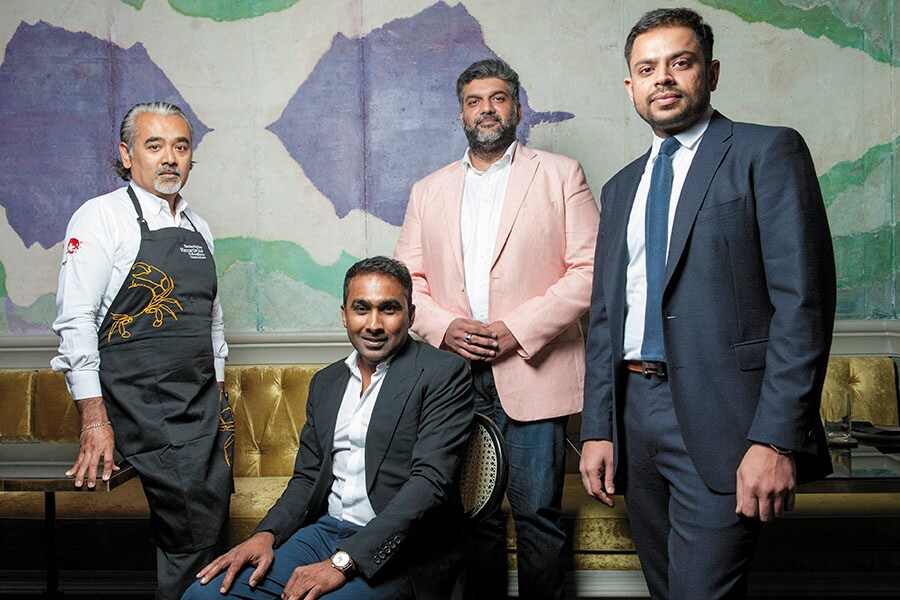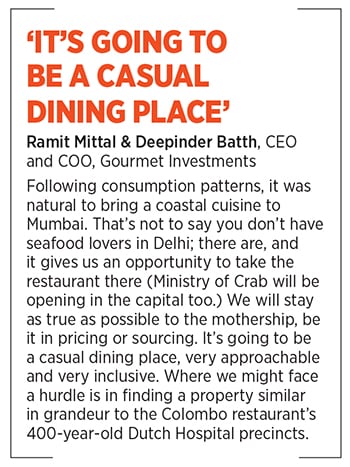
Like in cricket, you need the right partnership in business too: Mahela Jayawardene and chef Dharshan Munidasa
Ex-cricketer Mahela Jayawardene and chef Dharshan Munidasa, two-thirds of Colombo's Ministry Of Crab, discuss their first foreign outpost in Mumbai
 (From left) Chef Dharshan Munidasa, former Sri Lankan cricket captain Mahela Jayawardene, Ramit Mittal (CEO) and Deepinder Batth (COO) of Gourmet Investments
(From left) Chef Dharshan Munidasa, former Sri Lankan cricket captain Mahela Jayawardene, Ramit Mittal (CEO) and Deepinder Batth (COO) of Gourmet Investments
Image: Mexy Xavier
Flourishing partnerships aren’t new to Kumar Sangakkara and Mahela Jayawardene. With close to 54,000 international runs between them, the duo has arguably been Sri Lanka’s most pre-eminent cricketers in the last decade and a half. Remember their partnership of a colossal 624 runs in a 2006 Test against South Africa in Colombo? No surprises then that they have carried their mojo off the cricket field as well. In December 2011, Sangakkara and Jayawardene, with chef Dharshan Munidasa, launched a restaurant, Ministry of Crab, which, in six years, has featured thrice on the list of Asia’s Top 50 Restaurants. Now, they are walking the franchise route to take Ministry of Crab beyond Sri Lanka. Jayawardene and Munidasa were recently in Mumbai to announce their first outpost in the city in association with Gourmet Investments, which represents UK-chain Pizza Express in India. While the location and the date of the launch are still under wraps—“It will be between April and June; we are targeting the IPL season,” is all that Gourmet Investments will say—Jayawardene and Munidasa spoke to Forbes India about what makes their restaurant tick.
Q. How do two cricketers and a chef come together for a restaurant?
Dharshan Munidasa: I hadn’t watched a single cricket match before I got to know Kumar and Mahela, so you could say ours was a food-centric friendship. They were regulars at my first restaurant Nihonbashi [in Colombo, which serves Japanese cuisine]. The idea of a crab restaurant came after my TV show Culinary Journeys with Dharshan. An American friend was involved, but he eventually stepped away. Then I shared the idea with Kumar and Mahela, who joined in.
Mahela Jayawardene: Both Kumar and I are foodies. Whenever we travel, we seek out good eateries. When we started Ministry of Crab, the idea was that Sri Lankan lagoon crabs, mostly exported, should get their identity in the country. We initially thought it wouldn’t get local diners as the price was a bit high, but everyone loved it.
Q. Since 2013, the Indian media has reported about your interests in bringing the restaurant to the country. What took you so long?
DM: Half of those stories are not true. I came and did some pop-ups and some people who were interested started talking. But we couldn’t have done it in a huff. It was like handing over our baby. We needed to find the right partners.
MJ: During many of our interviews, Kumar and I were asked if we would bring our restaurant to India and we would say, hopefully yes. It was interpreted as we were coming that particular year itself. So, ‘we want to come to India’ got translated into ‘we are coming to India’. But we were in no hurry; we aren’t a fast-food chain. We wanted to ensure we get the right product and the right partners to expand with.
Q. You [Jayawardene] and Sangakkara were big brands on the cricket field. What does it take to build up a similar equity off it?
MJ: Cricket, for both Kumar and me, was fantastic, but that chapter has ended. Now, it’s time to pursue other passions; the restaurant is one among them. Having Dharshan in that venture is a great thing. He takes care of the main thing, the kitchen, and we don’t tell him what to do there. But Kumar and I also want to make sure that Ministry of Crab creates value as a brand. That’s why we have been careful about how we want to proceed. We are pretty hands-on in the business. We get our daily updates and numbers on WhatsApp, we even have our board meetings on WhatsApp. The approach is casual, but we are very much involved.

MJ: Two things: Right partner, who knows what he is doing. Dharshan is a workaholic, he’s there from 10 am to midnight to ensure everything is in order. The other thing is, as I said, we are hands-on. We haven’t given it to someone else and let them run it. We are careful that we give the right atmosphere to the product. Sometimes, if Dharshan is travelling and if we are in town, Sanga and I drop in, sit at the bar and keep a watch on how things are going; sometimes we go and say hello to the customers. In whatever you do, you need to have control and give your 100 percent.
Q. You [Jayawardene] have played cricket with Sangakkara as skipper and vice versa. Who’s the boss at the restaurant? Or is it Dharshan?
DM: We tossed a coin to decide who the chairman would be. Mahela won it, so he’s the boss [laughs].
Q. What changes are you going to make to cater to Indian diners?
DM: The price point will depend on what the ingredients will cost here. There wouldn’t be any changes to the menu, only some additions to accommodate the local palate. But we don’t want to tweak much. We are here to serve crab, and making too many changes, like ramping up the vegetarian menu, will be counterproductive to our DNA.
Q. A number of movements, like farm-to-fork, are sweeping the culinary landscape. Do you subscribe to any of them?
DM: Farm-to-fork was always there; how else, for instance, did you get your chicken? Now it’s just a fancy word to indicate a product isn’t frozen. I don’t subscribe to any of these fancy trends. Our crabs aren’t farmed, they are caught in the wild. Right now, we are trying to encourage sustainability studies among crab farmers. Besides, Ministry of Crab is a no-refrigerator restaurant, all our produce is fresh. That reduces our carbon footprint. We don’t serve water in plastic glasses. We don’t serve synthetic colas; our drinks are all preservative-free, natural.
(This story appears in the 30 November, -0001 issue of Forbes India. To visit our Archives, click here.)





